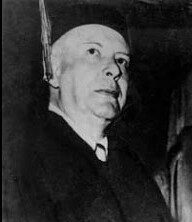"Less and Less Human, O Savage Spirit"
Transport to Summer (1947)
Contexto: p> If there must be a god in the house, must be,
Saying things in the room and on the stair,Let him move as the sunlight moves on the floor,
Or moonlight, silently, as Plato's ghostOr Aristotle's skeleton. Let him hang out
His stars on the wall. He must dwell quietly.He must be incapable of speaking, closed,
As those are: as light, for all its motion, is;As color, even the closest to us, is;
As shapes, though they portend us, are.It is the human that is the alien,
The human that has no cousin in the moon.It is the human that demands his speech
From beasts or from the incommunicable mass.If there must be a god in the house, let him be one
That will not hear us when we speak: a coolnessA vermillioned nothingness, any stick of the mass
Of which we are too distantly a part.</p
